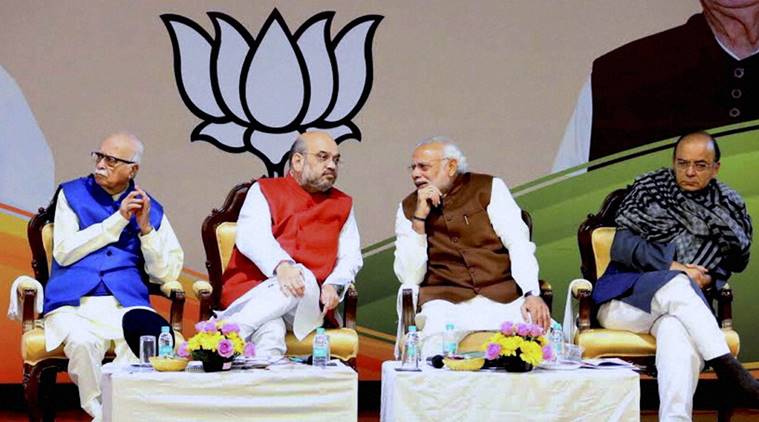State Assembly Elections 2017
Implications of State Elections 2017
The past month begin with a series of
elections throughout India for five states, namely Uttar Pradesh, Punjab,
Manipur, Goa and Uttarakhand. Uttar Pradesh elections have always been more
than just another state elections. One of the biggest states of the Indian
geography, this region sends maximum number of MPs from any state. Most Prime
Ministers have been from UP. However this time it has become even more
significant in the wake of intolerance debate, ghar-wapasi, demonetisation and
Modi's performance after coming into power. Let us see what does this election and
other state elections really mean to the politics of India.

Modi wave has not burned out.
His landslide victory in a agricultural-based
state economy ,where a sizeable population is small farmers , landless
labourers despite the inconvenient demonetisation drive which hit poorest the
hardest, proves his charishma over the people of the country. And these
elections were all fought in his name. This clearly shows that his popularity
among the masses hasn't faded with time.
AAP is still
not a national party
AAP certainly created a hole in the two-party
electoral contest of Punjab. The Indian diaspora of Punjab were supporting AAP
from abroad. A lot of them in fact came to the state and campaigned for the
party till the voting. Rival parties link this support with separatist movement
alleging the party from supporting Khalistanis and thus being a threat to nation's
integrity. Also AAP's over-enthusiastc appeasement for the majority in
achieving seats is thought to be reason of its poor performance. However in Goa, AAP was not even in the main fight in any constituency where it secured merely 6.3% of total votes. Its candidates came in third in only a couple of constituencies. Even CM candidate Elvis Gomes finished fourth in the constituency. The party fielded professionals such as doctors and architects in amny seats. People at large were evidentl not convinced about their ability to get little things done -like getting admissions, loans and electricity connections- that people outside the networks of influence seek from their representatives. So despite tremendous efforts AAP could not establish itself as a 'national' party(not just in the technical sense).
Muslims are
neglected in state elections
Not a single seat was given to Muslims by BJP
in the UP election, where a sizeable chunk of people belongs to the community.
Muslims may be claimed by the BJP to have voted for them as they secured
three-fourths majority but it is a truth that a lot of their votes got divided
between BSP and SP. A JNU professor wrote 'The election campaign was based upon
the communalised development. The BJP repeatedly told Hindu voters how Hindus
were neglected for the sake of minority appeasement, which has been the
practice of past governments.' Till the time of writing this article, Yogi
Adityanath has sworn as a chief minister of the Utter Pradesh. Originally Ajay
Singh Bisht, Yogi, a firebrand leader with his Hindutava agenda, is notorious
for his controversial remarks over muslims and Pakistan.
The way things would go in UP, will decide the agenda of Bhartiya Janta Party in 2019 elections. Modi would come with a strict Hindutava agenda if Yogi's tenure would be accepted by the mainstream of the country. However there is a possibility that sending extremist leaders to the top dilutes their passion for majority and repulsion for minority( what happened with Modi on being elected as PM. In 2002 he was a hardcore Hindutava extremist leader).
The way things would go in UP, will decide the agenda of Bhartiya Janta Party in 2019 elections. Modi would come with a strict Hindutava agenda if Yogi's tenure would be accepted by the mainstream of the country. However there is a possibility that sending extremist leaders to the top dilutes their passion for majority and repulsion for minority( what happened with Modi on being elected as PM. In 2002 he was a hardcore Hindutava extremist leader).
Congress
made a comeback
Congress start winning seats after a series
of humiliating defeats in Lok sabha elections 0f 2014 and various states across
the country. INC won maximum number of seats in Punjab, Goa and Manipur.
However due to lack of clear majority and nation-wide dominance of BJP, they
couldn't get support from other parties and failed to make coalition
governments. This might be relief to those who believe in importance of
opposition in working of democracy.
Irom Sharmila faced a stunning defeat
The world renowned human rights activist Irom
Sharmila, who held a 16 year long hunger strike against the draconian AFSPA act
lost her first election against the former chief minister of the state. She got
merely 90 votes, which was even less than NOTA( None of The Above). This came
as a huge shock to human right activists across the country. Critics cited it to
her stated reason of marriage for quitting her fast as the key in her defeat(
which is unplausible, as she wanted to come to power for action against AFSPA
act).

And after the elections this is how India looks like:

And after the elections this is how India looks like:



Comments
Post a Comment